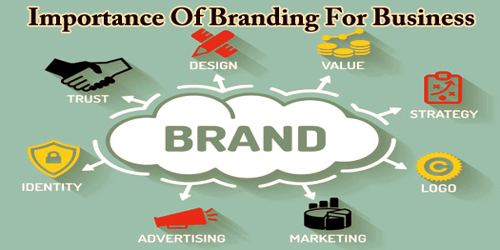Branding is a marketing method in which an organization establishes an easily recognizable name, emblem, or logo as belonging to the product. Brands are used for identification in industry, marketing, and advertisement and, most importantly, to build and store interest as brand equity for the branded product, to the advantage of the consumers, owners, and shareholders of the brand. Companies become very closely related to their brand, if not synonymous with, their brand. This helps to spot a product and distinguish it from other products and services. The more the brand is worth, the upper brand equity it’s said to possess.
Branding is vital because not only is it what makes a memorable impression on consumers but it allows our customers and clients to grasp what to expect from our company. It represents the face of the corporate, the recognizable logo, slogan, or mark that the general public associates with the corporate. Consider a brand sort of a person, each individual has their own personality, way of dressing, communicating, their own values, friends, characteristics, and story to tell; it’s this that produces up who we are and it’s also these characteristics which make a brand.
The name or brand of a company brings with it a monetary interest in the stock market (if the company is public), which affects the value of the stockholder as it rises and falls; for these purposes, it is necessary to preserve the credibility of the label. There are many aspects used to create a brand including advertisement, customer support, promotional products, prestige, and logo. All of these elements work together to create a specific professional profile that will (hopefully) attract attention.
People don’t tend to own relationships with products, they’re loyalty and commitment is to the brand. When an organization decides to choose a brand to be its public image, it must first determine its brand identity, or how it wants to be viewed. Branding is completely critical to a business thanks to the impact it makes on our company. It can change how people perceive our brand, it can drive new business and increase brand awareness.
A successful brand accurately portrays the message or feeling the corporate is trying to induce across and leads to brand awareness, or the popularity of the brand’s existence and what it offers. The brand is the most significant element of branding, especially where this factor is worried because it is actually the face of the corporate. Building a brand helps us to form trust with our target market; it helps to form brand loyalty, so these customers still keep returning.
Branding is crucial when attempting to attract potential sales and by giving the company more influence in the market, a well-defined brand will improve the appeal of the sales. On the other hand, miscommunication is sometimes the product of inadequate branding. Branding allows it a more appealing investment opportunity, because of its already defined marketplace position. For example, we buy Nike because it’ll make us feel trendy and capable of doing anything. Nike represents specific values and communicated them to its audience in a good way plenty of our purchasing power relies on our emotional reactions.
A strong brand won’t bother drumming up referral sales. The business is said to have established brand equity once a brand has generated positive feelings in its target audience. Strong branding generally means there’s a positive impression of the corporate amongst consumers, and that they are likely to try to business with us due to the familiarity and assumed dependability of employing a name they’ll trust. A standardized and clear offering along with a positive brand experience puts the customer at ease; because they know exactly what to expect on every occasion they engage with the brand. Once a brand has been well-established, word of mouth are going to be the company’s best and handiest advertising technique.
Branding strategies aren’t only created to extend the quantity of consumers of a company or to draw in top-quality talent. When an employee works for a strongly branded company and truly stands behind the brand, they’re going to be more satisfied with their job and have a better degree of pride within the work that they are doing. Branding helps companies shape their company’s reputation and attract a spread of stakeholders: customers and employees, but also investors, business partners, providers, governments, opinion leaders, purchasers, and licensees, etc.
Another part of branding is an advertisement, and advertising campaigns must specifically represent the brand and its desired portraiture. Branding is more than product design, a logo, or a strapline; it is about all of these things and more, customer experience, brand promises, philosophy, and culture of the business. Advertising techniques like the employment of promotional products from trusted companies like Outstanding Branding make it easy to make a cohesive and appealing advertising strategy that plays well into our branding goals. An honest brand engenders trust within the consumer, and, after having a decent experience with one product, the buyer is more likely to undertake another product associated with the identical brand.
Information Sources:
















